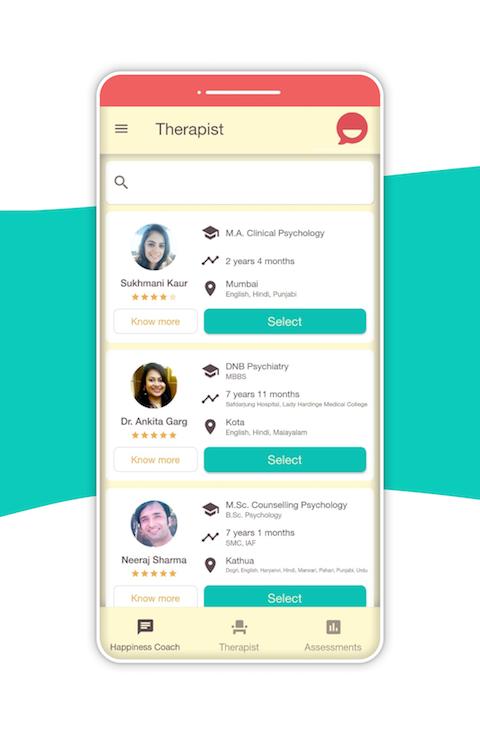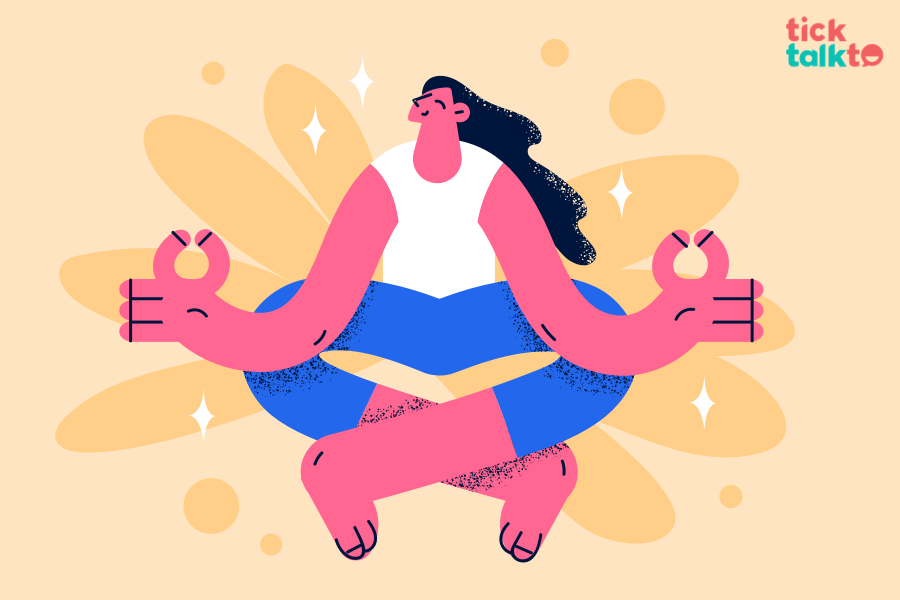10 Breathing Exercises that can help ease Anxiety
If you are a yoga enthusiast, you might practise breathing during your yoga sessions. You may have heard the phrase “practice breath exercises” in the event that you had to see your therapist or your doctor. If you’re under stress, you could have done it. You may have watched yoga videos that talk about how to breathe deeply and relax and feel better. The real issue is, what exactly is this breathing technique and how can it assist those suffering from anxiety? Breathing exercises for anxiety is an ancient technique that has been used for centuries to reduce anxiety and stress. They also aid in calming your mind by staying focused on the present.Yoga & BreathingBreathing is a crucial aspect of yoga. It has a long history and includes breathing exercises, such as pranayama. There are many breathing exercises you can choose from, including the four-eight-7 breath technique. Other breathing techniques include lion’s breath, equal breathing, and nostril breathing. These breathing exercises involve sitting in a kneeling posture and breathing out and in through the nostrils.Many different kinds of breathing exercises can assist to ease anxiety. A lot of people report that doing these exercises help them ease their tension and decrease their heart rate. The trick is to concentrate on taking slow, deliberate breaths. The more deep the breaths, the more restful they will be. Some people notice that they can practice breathing exercises alongside meditation or yoga, which could help lower anxiety levels.What is the best time and method to practice breathing exercises?It is the first thing to determine the right position to do breathing exercises. They can be done in a sitting position, standing position, or lying down. Begin small and gradually increase to a few minutes per day. Though mornings are considered the right time for breathing exercises, one can perform it at any part of the day keeping a gap of 4-5 hours after food.It is possible to practice breathing exercises in a variety of environments too. This means that breathing exercises are not only meant for solitude or meditation. It is possible to practice breathing exercises while riding the bus, at the checkout line of the grocery store, while walking and running, or just before going to sleep. The essence of mindful exercises is that they are a possibility to explore in any situation no matter if you have 30 seconds or thirty minutes spare.How breathing techniques that help you manage anxietyWhen you breathe deeply and deeply, you’ll reduce your body’s production of cortisol, a stress hormone. Also, it lowers blood pressure and enhances your diaphragm. It also relaxes muscles and boosts oxygen consumption. For the greatest benefit, it is best to find a quiet spot in which you can practice the breathing method. You must ensure that you sit in a comfortable posture and focus solely on breathing.While performing the breathing exercise It is recommended to close your eyes so that you can eliminate distracting visual stimulation and completely immerse yourself in the meditation. It may take some time to get comfortable with the method. The practice of breathing can assist you in managing tension and anxiety in a variety of different situations. If you practice the technique consistently and regularly, you’ll find yourself less anxious and more at ease.10 types of Breathing Exercises1. Resonance breathingResonance breathing exercises concentrate on breathing with a rhythmic rhythm that is believed to reduce anxiety. They also increase the variability of your heartbeat and can help to counter the fight or flight response that many people feel under stressful circumstances. Try this breathing practice to discover how it can enhance your everyday life.Breathing exercises that are resonance-based are founded on the research of resonance. They can be an effective method to lower stress levels. They require slow, consistent breathing, at the rate of five breaths every minute. The goal is to get your breathing pattern as close to your heartbeat as possible. Resonance breathing can aid your body and mind to calm and focus on the task at hand.2. The 4-7-8 breathing techniqueThe breathing technique of 4-7-8 is a quick and effective technique to decrease tension and anxiety. The parasympathetic nervous system decreases your body’s reaction to stress. If this response is lowered, you’ll feel relaxed and calm. It also allows your mind to relax, which allows you to process thoughts and answer questions more easily. The majority of people are unable to breathe deeply and breathe slowly which can cause stress and anxiety. When you focus on the act of mindful breathing and breathing, you’ll be able to clear your mind and have less anxiety.It is also possible to use the breathing technique 4-7-8 while you’re asleep. This technique will not only help you to fall asleep quicker and sleep better, but it can aid in managing your anxiety. It’s the first thing to do is locate an area that is quiet, get comfortable and concentrate on your breathing. While you work on this technique you’ll become more comfortable and in the rhythm.The breathing technique 4-7-8 is simple to perform and doesn’t require any equipment. You can practice it anytime, anyplace. Be sure to keep practicing it consistently. It is recommended to practice the breathing method at least twice every day. As you begin to learn the technique, it may be easier to practice the technique sitting up straight, with your feet lying flat on the floor.3. Purse lips breathingPurse lips breathing is an effective method to reduce anxiety and lower your heartbeat. It’s an effective method to reset your routine and allow your body to let go. Additionally, pursed lip breathing can aid in the treatment of COPD. Focusing on breathing while inhaling and exhaling from your mouth and breathing through your pursed lips can aid in reducing COPD symptoms too.A study showed that breathing through the purse lips helped patients who suffer from COPD to ease symptoms and increase their endurance to exercise. The practice also increased the amount of oxygen in the blood of those suffering from COPD. It also provides sufferers of COPD the feeling of being in control of their breathing. It can help prevent boredom and anxiety difficulties. If you are trying to practice breathing with your lips pursed all you have to do is keep your lips and then hold them in a puff for about four to six minutes. After that, you can breathe slowly, without having to breathe out.4. Breathing with alternate nostrils Alternate nostril breathing can help you concentrate on your breathing and blocks out distractions and is frequently connected to yoga, meditation, and mindfulness techniques. Alongside enhancing your mental well-being It has also been linked to lower levels of stress hormones and a decreased heart rate. It also has been reported to boost the vagus nerve which helps to relax and reduce anxiety.If you’re practicing breath breathing with alternate nostrils, it is important to be able to concentrate on breathing for approximately 30 minutes. Inhale four times and exhale six to eight times. As you gain experience you can extend the duration of each breath and increase breath retention. Learn how to master this technique by watching instructional videos or from a yoga instructor.Another benefit of alternate-nostril breathing is the fact that it activates different brain regions. The sympathetic nervous system controls the fight or flight reaction, the parasympathetic nerve brain is the one responsible for feeling relaxed and calm. This breathing method has been proven to lower the levels of blood lactate. This is a compound linked to anxiety and panic attacks.5. Deep breathing exercisesAn exercise in breathing that aids to ease anxiety is known as deep breathing. The practice can be performed at any time and doesn’t require any specific equipment. It is possible to practice it at your workplace, at home, or any other place you feel at ease. The most important benefit of this method is that it lets you slow your breathing down in order to breathe more slowly. It is the first thing to do by closing your mouth, and then slowly inhaling by breathing through the nose. Be sure to not overfill your lungs and you can repeat the exercise as many times as you’d like.6. Diaphragmatic or abdominal breathingThe abdominal breathing exercises for anxiety can help to manage your anxiety levels. These exercises are like other techniques for deep breathing that involve stretching and inflating the diaphragm. Set a hand on your abdomen and chest and take deep breaths by stretching your abdomen. Try this breathing technique for at least 2 minutes each day, a couple of times per day, or more frequently depending on the need. If we’re under stress it is common for us to take quick breaths, which means that oxygen is not adsorbed and absorbed into the body, leaving us feeling exhausted and dizzy. Breathing in your abdomen can aid in absorbing more oxygen into your system and you will feel more energised.7. Box breathing or 444 breathingBox breathing is a simple and effective way to reduce anxiety attacks. It involves imagining an empty square, and then breathing in as you look up, down, across, and up on the sides of the box. This will help you concentrate on the task, and it is easier to master with time. It is also known as 444 Breathing Technique.444 Breathing Using the breathing pattern 4×4 it is necessary to inhale deeply for four seconds, followed by exhaling deeply for 4 seconds. The process lasts for approximately 1 minute, and your nervousness and stress will settle down. That’s it. It’s that simple. it. In addition to feeling you are calmer and relaxed, you notice physical changes as well. Utilising this method, you inhale through your nose, with your stomach expanding as you breathe. Exhaling, you may either use your mouth or lips pursed, with your stomach expanding.This breathing method is effective because of the physiological impact breathing has on the nervous system. The slow, deep breathing process triggers the hypothalamus, linked to the pituitary gland within the brand. It sends out neurohormones that block stress hormones such as cortisol and adrenaline. They are prevented from being released. This causes a relaxing reaction in the body. In addition, breathing deeply and gradually triggers the parasympathetic nervous system to release hormones that reduce heart rate and blood pressure and trigger an overall relaxation response within the body.8. Mindfulness breathingThe importance of breathing in meditation was mentioned in the old Buddhist texts, Anapanasati Sutta, which also contained information on insight meditation and other meditation practices. Thich Nhat Hanh described the breath as “the bridge that connects the world with consciousness.” This is an exact description of this intangible vital force that is a means of moving from the invisible, external reality of the world surrounding us to the internal physical reality we live in.9. The breath of the lion The breath of the Lion is usually performed when you perform Simha – asana or the Pose of Lions. But you can also practise the breathing exercise in a separate practice. Simha pranayama is a form of breathing in Sanskrit”Lion’s breath” is a powerful breathing practice that can help you relax your mind, increase your confidence and strengthen your vocal cords. It can also help with thyroid issues and relieves symptoms that cause anxiety and stress.In Lion’s breath when you open your mouth wide and stretch the tongue down, you are stretching your neck, jaw, and facial muscles. The sound you create when you exhale is similar to a roaring lion. It comes emanating from your belly.10. Pranayama techniqueWho hasn’t heard of pranayama and its advantages? It’s true that the most ancient breathing techniques that were imposed by the ancient sages from times past have become synonymous with other breathing methods. The yogis have been aware for centuries — and as medical science is starting to understand, breathing has remarkable power to heal. Through controlling their breathing (a practice known as Pranayama) the yogis realised that they could change their mental state. The three pranayama techniques explained here produce their effects by slowing and regulating breathing. The breathing process is triggered by what scientists call the parasympathetic nervous system which is a complex biological system that calms and soothes us. When breathing is slow, it raises the level of carbon dioxide in the blood, which pushes the pH back to a more alkaline state. As blood’s pH shifts and the parasympathetic nervous system helps us relax in various ways that include instructing the vagus nerve to produce acetylcholine. This is a substance that slows the heart rate.Just relax and enjoy.Have you ever noticed a young baby or any animal, like a cat or dog? They breathe in a rhythmic manner and in certain patterns. They appear so relaxed, even when their complaints are unbearable because no one is able to understand their dialect. They live in the present. A child smiles 300 times per day, while for adults, it requires a workout of 300 muscles to smile for a single time. The breathing patterns these adorable creatures adopt keep them focused and they feel less stress than we do. Since the stress-reducing hormones are released in large quantities. As we get older we lose this natural breathing technique and become prone to stress, depression, and anxiety. We also engage in yoga, meditation, and breathing exercises in order to be in tune with our mind, body, and spirit. Being mindful of our breathing can help us combat various illnesses and enhance our overall well-being. From now on, take a deep breath and take a moment to relax!!ReferencesGet to know more about breathing exercises:











 Depression
Depression






 Lavanya Vallabh
Lavanya Vallabh





